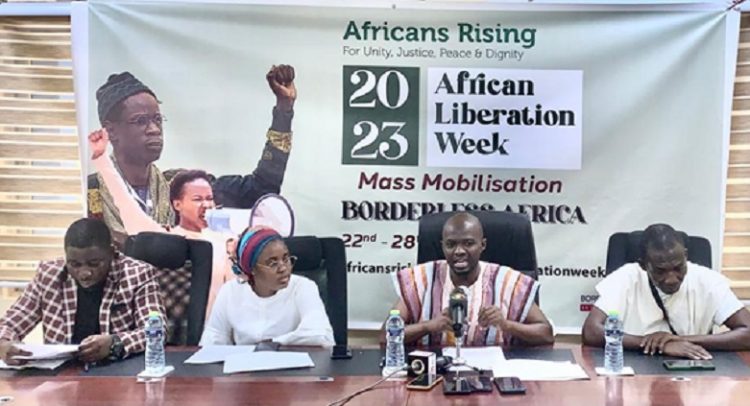Hardi Yakubu (second right) speaking at the event
Pan-African Movement of people, organisations, working for unity, justice, peace and dignity, Africans Rising, has called for the ratification of the African Union’s (AU) Free Movement of Persons Protocol without any hindrance.
According to the movement, the ratification will help boost trade and employment opportunities.
Movement Coordinator of African Rising, Hardi Yakubu speaking at the Launch of the 2023 African Liberation week said, “numerous studies have shown that free movement of Africans has the potential to boost trade and employment, and catapult the African economy to the highest heights.”
“We therefore call on African states to immediately ratify and implement the free movement of person protocol” he added.
He said the current protocol of free movement of goods brought the African continental free Trade Area (AFCFTA) into being, indicating that the great momentum that has been garnered in pursuance of the movement of goods should be channeled to the movement of people.
Mr. Yakubu stated that the movement’s call for the free movement of people on the African continent falls under the Borderless Africa Campaign which was the initial vision of the Oganisation of African Unity.
“Boarderless Africa is to ensure that African People can Move Freely across Africa without any hindrance. We want the abolishment of visa requirement for intra-African Travel, the removal of all boarder restrictions, the mass rollout of the African Passport including making it available to Diaspora families,” he said.
He further went ahead to encourage Africans to unite and prevent exploitation to become completely independent.
“Whereas we are the producers of materials that feed the world’s industrial economy, our people still remain poor and in abundance of water we are still thirsty” he lamented.
He added, “Our quest to unite and build strength is so that nobody can exploit and dominate us because of our unique history and what our forefathers have to endure just to secure our dignity as human beings.”
By Jamila Akweley Okertchiri & Nafisa Abdul Razak


